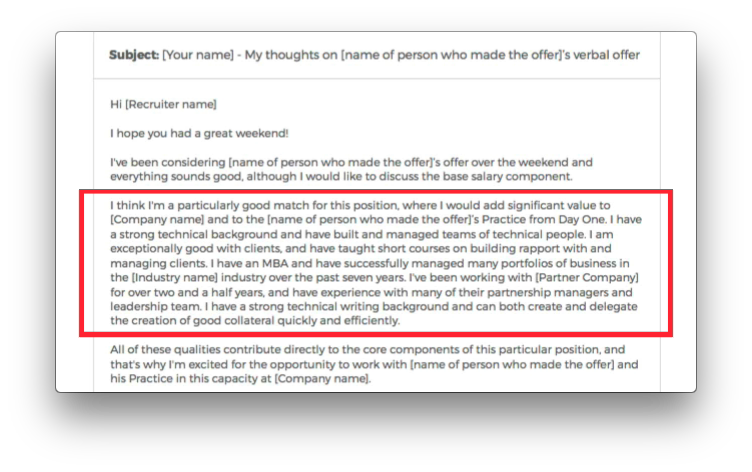Negotiating Your Salary: Even After A "Best And Final" Offer

Table of Contents
Understanding the "Best and Final" Offer Tactic
The phrase "best and final offer" is often a negotiating tactic employed by employers, not necessarily a firm, immovable stance. While it might seem like a closing statement, understanding the employer's motivations behind using this phrase is crucial to your response. They might be trying to:
- Save time and resources: Negotiations can be time-consuming, and employers may want to expedite the hiring process.
- Pressure candidates into accepting quickly: Creating a sense of urgency can sway a candidate towards acceptance, even if the offer isn't ideal.
- Test the candidate's commitment: By presenting a "best and final offer," the employer gauges the candidate's level of interest and willingness to negotiate.
Recognizing this tactic as a potential maneuver, rather than an absolute, empowers you to proceed with confidence and continue the negotiation process.
Strategies for Negotiating After a "Best and Final" Offer
Even faced with a seemingly unchangeable offer, several strategies can help you successfully negotiate your salary and overall compensation package.
Reiterate Your Value
The most effective way to negotiate after a "best and final" offer is to powerfully reiterate your value to the company. This isn't about boasting; it's about presenting concrete evidence of your contributions.
- Highlight specific accomplishments in previous roles: Use quantifiable data to demonstrate your past successes. Instead of saying "I improved team performance," say "I improved team performance by 15% in six months, resulting in a $50,000 increase in revenue."
- Quantify your contributions using numbers and data: Numbers speak louder than words. Back up your claims with concrete evidence of your impact.
- Showcase how your skills align with the company's goals: Demonstrate a clear understanding of their business needs and how your skills directly address them. Show them you are the right candidate, worth the investment.
Explore the Total Compensation Package
Don't solely focus on base salary. A comprehensive compensation package includes many elements beyond the initial salary figure.
- Negotiate vacation time, flexible work arrangements, and professional development opportunities: These perks can add significant value to your overall compensation.
- Explore options for performance-based bonuses: Inquire about the possibility of earning bonuses based on performance metrics.
- Inquire about health insurance, retirement contributions, and other benefits: A strong benefits package can significantly impact your overall financial well-being.
By broadening your negotiation scope, you might find that the total compensation package is significantly more attractive even without increasing the base salary.
Leverage Competing Offers (if applicable)
If you have other offers on the table, you can strategically use this information to strengthen your negotiating position. However, this should be done subtly and professionally.
- Focus on the positive aspects of other offers relevant to your needs: Don't simply state the higher salary; discuss the aspects that better meet your career goals and overall package value.
- Don't directly compare salaries; emphasize overall package value: The overall value of a package might be superior, even if the base salary is marginally lower.
- Frame it as wanting the best fit, not just the highest salary: Emphasize that you're seeking a role where you can thrive and contribute most effectively, showcasing your commitment to the company's success.
This approach shows that you are sought-after, demonstrating the value you bring to the hiring process.
Prepare for Potential Rejection
Knowing when to walk away is crucial. Have a clear understanding of your minimum acceptable salary and be prepared to do so if necessary.
- Have a clear understanding of your financial needs and priorities: Determine your minimum requirements to ensure you’re not settling for less than you deserve.
- Don't be afraid to walk away if the offer doesn't meet your minimum requirements: Your time and skills are valuable. Don't undervalue yourself.
- Weigh the pros and cons of accepting vs. continuing your job search: Consider all factors and make an informed decision.
Common Mistakes to Avoid During Salary Negotiation
Avoiding these common mistakes will significantly improve your chances of a successful salary negotiation:
- Being overly aggressive or demanding: Maintain a professional and respectful demeanor throughout the process.
- Underselling your skills and experience: Know your worth and articulate your value confidently.
- Not having a clear understanding of market value: Research industry salary ranges before negotiating.
- Failing to prepare for potential objections: Anticipate potential counterarguments and develop effective responses.
Conclusion
Receiving a "best and final offer" doesn't automatically mean the end of salary negotiation. By understanding the tactics involved, strategically presenting your value, and exploring the entire compensation package, you can significantly improve your chances of achieving a more favorable salary. Remember to prepare for the possibility of rejection, but don't be afraid to advocate for yourself and your worth. Don't let a seemingly final offer deter you; master the art of negotiating your salary even after it seems like all cards are on the table. Start planning your next negotiation strategy today! Learn to effectively negotiate your salary, and secure the compensation you truly deserve.

Featured Posts
-
 Ihanete Toleransi Olmayan Hemen Intikam Alan Burclar
May 23, 2025
Ihanete Toleransi Olmayan Hemen Intikam Alan Burclar
May 23, 2025 -
 London Calling Grand Ole Oprys Royal Albert Hall Debut Broadcast
May 23, 2025
London Calling Grand Ole Oprys Royal Albert Hall Debut Broadcast
May 23, 2025 -
 Jonathan Groffs Just In Time Opening Star Studded Broadway Support
May 23, 2025
Jonathan Groffs Just In Time Opening Star Studded Broadway Support
May 23, 2025 -
 Did House Of The Dragons Milly Alcock Get An Acting Coach
May 23, 2025
Did House Of The Dragons Milly Alcock Get An Acting Coach
May 23, 2025 -
 Wwe Wrestle Mania 41 Golden Belts And Memorial Day Weekend Ticket Sales
May 23, 2025
Wwe Wrestle Mania 41 Golden Belts And Memorial Day Weekend Ticket Sales
May 23, 2025
